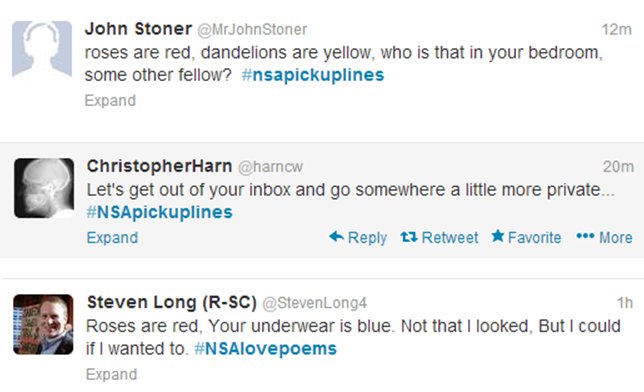As Edward Snowden settles into his new life in Russia, and Facebook inc. faces accusations of providing information to government officials about protesters in Turkey, issues of privacy are on the lips, minds, and newsfeeds of many global citizens.
Citizens sit with the uncomfortable and now undeniable reality that we are being watched. That our own governments, in many cases, are doing the watching. And that the economic, social, and interactive structures makes this kind of surveillance largely impossible to avoid.
I have noticed an interesting trend as people work through what many view as an unfortunate inevitability of pervasive surveillance: the use of play as a form of resistance. To be sure, PJ Rey (@pjrey) is our resident Play Theory expert here at Cyborgology. I am an admitted novice to this line of theory. As such, I hope that those with greater expertise than I will supplement my wide-eyed sociological noticings with established or developing social theorists and their theories.
Two particularly interesting examples strike me in their use of play as a serious form of political resistance.
First, we have Drone Hunting in Colorado. On October 8, the town of Deer Trail will vote on an ordinance to declare open season on government drones. Billed simultaneously as a tourist attraction and “symbolic protest” against government surveillance, the town plans to sell drone hunting licenses for $25/year, and offer a $100 prize to anyone who shoots down the targeted prey. There is even talk of a “fun-filled” drone hunting festival. This is a highly organized effort, One born of necessity, anxiety, and— perhaps ironically—a feeling of empowerment afforded by the spirit of capitalism. As reported by Denver Channel 7 News:
“They’ll sell like hot cakes, and it would be a real drone hunting license,” said Deer Trail resident Phillip Steel, who drafted the ordinance. “It could be a huge moneymaker for the town.”
Next, we have a less organized, but arguably equally as politically charged form of play: #NSAlovepoems and #NSApickuplines on Twitter. These are The Internet’s comedic responses to the less-than-funny news that NSA employees were using their power and access to data to acquire information about lovers and objects of romantic interest. In spy lingo, this misconduct is officially known as LOVEINT (Love Intelligence). The Twitter hashtags display NSA related pick-up lines, such as these:
Leaving aside an overreliance on the “roses are red” trope, these hashtags demonstrate the playful use of existing systems to combat undesirable conditions at the symbolic level.
Both of these examples, it seems, operate at the symbolic level. Twitter users express their discontent through an NSA accessible platform, complying with their own surveillance while speaking out against it. In Colorado, the residents of Deer Trail acknowledge that nobody will likely ever shoot a drone. In fact, drones aren’t even visible from the town, and there would be serious legal repercussions if someone did successfully damage the government’s property.
And yet, the symbolic matters. When a system is deeply ingrained, getting outside of the system may seem—and may indeed be—impossible. But dissenting from the system is not. This is open reflexivity, an activity instrumental in fostering—to use C. Wright Mills’ term—a Sociological Imagination. The public nature of these forms of play/protest alter discourses, and give regular citizens a chance to frame the discussion.
This is serious play. It’s fun. It’s funny. It’s accessible. And, using personal tactics, gets at the heart of public issues.
Headline Pic CC via Lance Fisher
Follow Jenny on Twitter @Jenny_L_Davis



Comments 3
ryan c — August 28, 2013
Roses are red, violets are blue, Its also what butler would call subverting the system from within. Excellent!!
Friday Roundup: August 30, 2013 » The Editors' Desk — August 30, 2013
[...] considers resistance through play (hashtags have power, people… I mean, maybe outside #shitgirlssay. That one’s got [...]